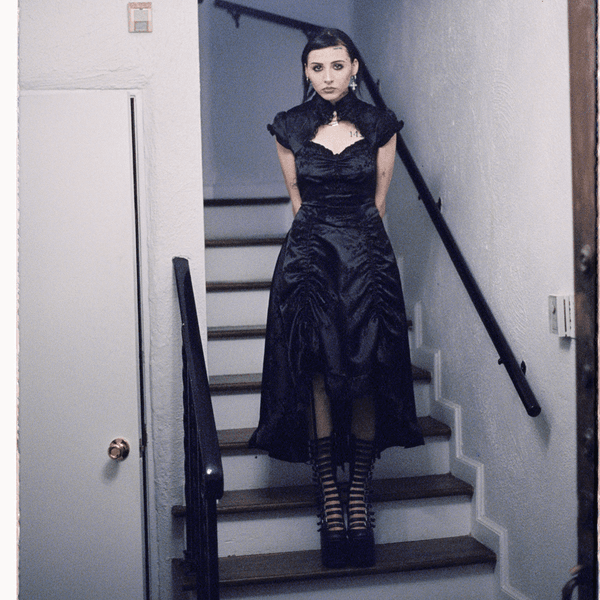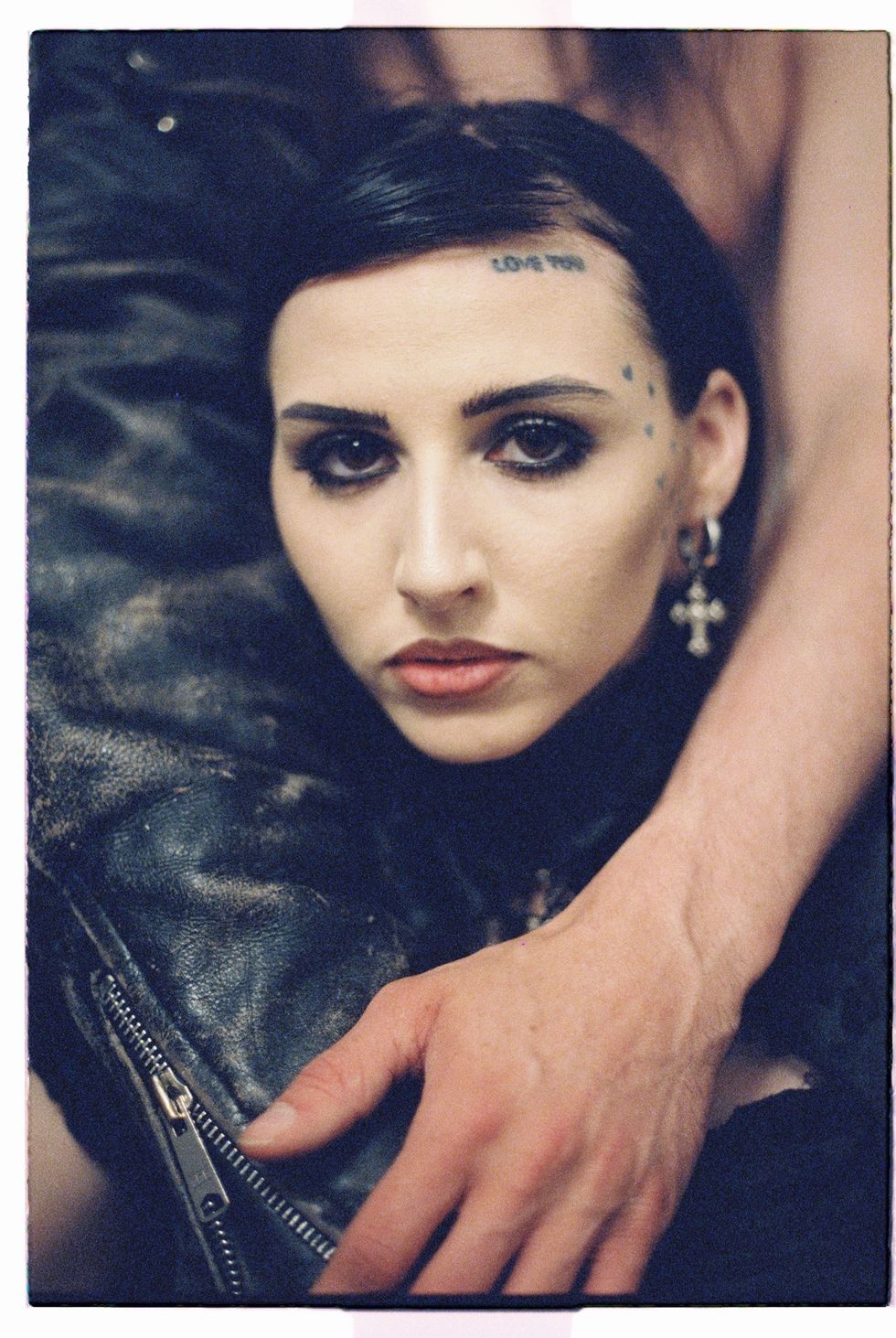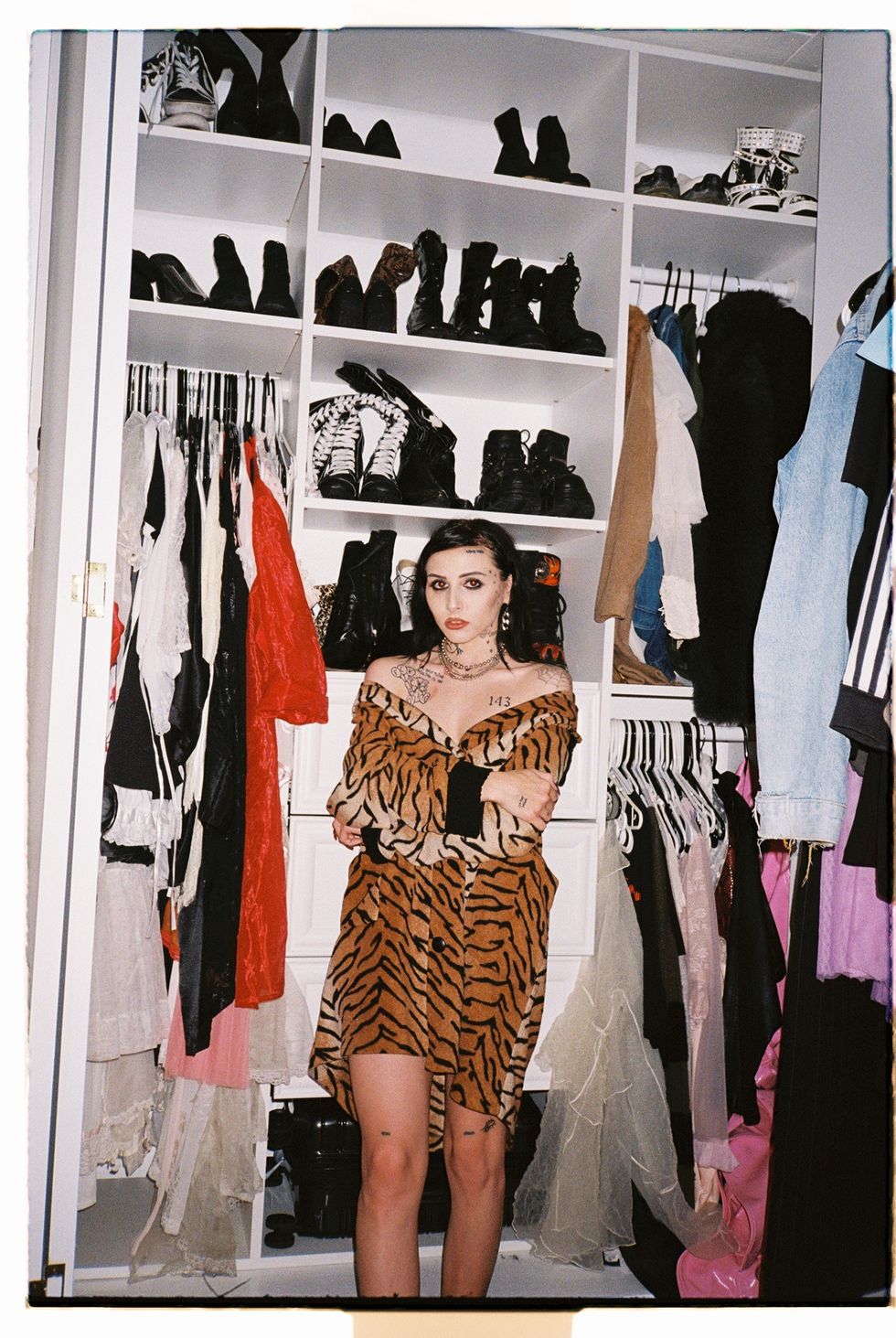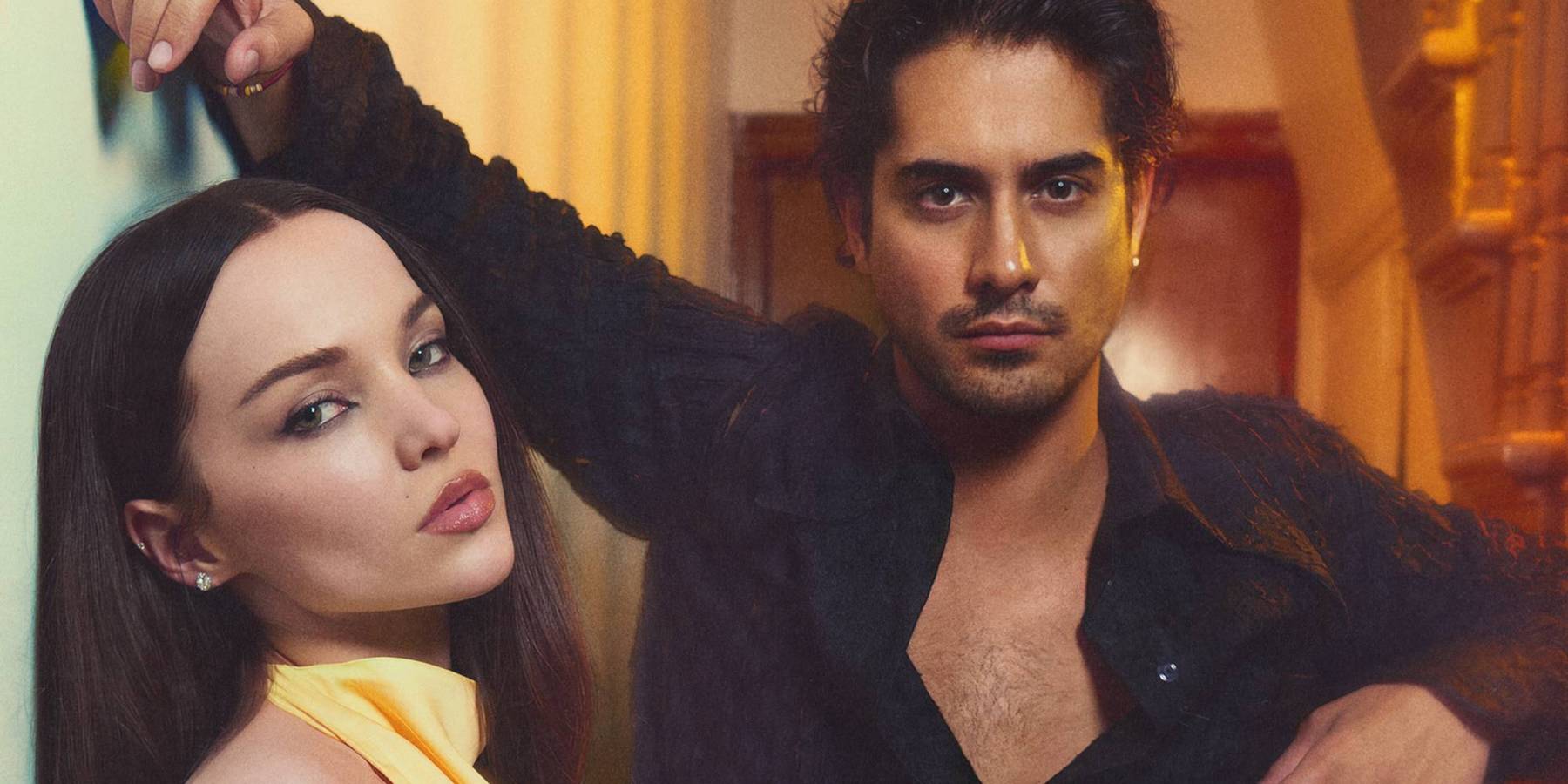
In Conversation: TOOPOOR and Maggie Lindemann
May 03, 2019
A knee jerk reaction to the Instagram accounts of pop's newest rebels, TOOPOOR and Maggie Lindemann, might be one of disbelief. Certain internet fan camps believe the two to be provocative for shock's sake; pictures on TOOPOOR's account seem to be lined with spikes and occasional gore, while Lindemann's seem to be taken straight out of a diary full of scrawls and dark scribbles. Those wishing to limit the two to these aesthetics, though, are ultimately sadly mistaken upon discovering their full artistic range.
TOOPOOR, before entering the music world with her own single, "Crazy Girls," was a DJ and social media expert, letting her followers in on her most chaotic and gorgeous moments. Lindemann, too, was popular on Instagram before she came out with hit after hit, accumulating millions of streams across several platforms on her songs "Would I" and "Pretty Girl," among others. The two are both poised for success in 2019, with fans at the ready to consume new content.
Related | 100 Women Revolutionizing Pop
The concentration of attention isn't all glitz and glam, however, and can sometimes even contribute to the darkness that shrouds some of their more glooming works. For this reason, TOOPOOR and Lindemann are focused solely on telling unfiltered stories in their music, hoping to connect to fans through their own vulnerabilities. Lindemann's "Would I," which PAPER premiered in November 2018, is an honest look at struggling with mental health in the context of baseless friendships and emptiness. The song was a courageous footnote when put up next to her previous hits, songs that seemed a bit glossier and popping comparatively.
TOOPOOR's first single, "Crazy Girls," is also a clear indication of a desire to display a more rebellious truth to an audience inundated by music industry monotony. A raw, grating guitar is squished against trap drums and a booming bass pattern, backing up TOOPOOR's cleverly crafted chorus. "Said he likes crazy girls/ But he hates when I act crazy/ It takes two to toxic," is nearly shouted in an over-it tone, a direct statement against some imposing, male-dominated gaze. She's frustrated by the confines of the relationship dynamic within the lyrics, but holds her power over the chaotic instrumentation effortlessly.
PAPER caught up with the emerging powerhouses to talk about speaking about their toughest moments through music, being called "goth," and where they want to go next with their music.
How do you guys know each other?
ML: How do we know each other? I think I first found you on Twitter or something. I remember you had the little short bangs and really short hair and I thought you just looked really cool, so I followed you. You followed me back a couple months later and we started DMing.
TP: Yes, this is true. I saw Maggie follow me, and I was honestly like, "Wow, cool pop star vibes!" Then I followed back. That was it. We didn't meet for like a year or two years later, we followed each other for a long time.
ML: Yeah, I randomly saw you for the first time at Mel's or something.
TP: We ran into each other at a diner at like, one in the morning.
ML: Yep.
What did you admire about each other's works?
TP: I admire any female artist. I feel like there's not enough female artists in the industry and really any that make it that far. I feel like Maggie is a good representation of an empowering woman.
ML: Thanks! I just admire your creativity. You're really in your own lane, you're the queen of your lane. You're fully yourself, and I like how you're really who you are. You don't have anything to hide, you're very genuine, a very real person. I feel like there's not enough people who are just fully themselves and feel confident doing it. I think it's really cool you can do that.
Related | The Rise of the Vulnerable Heroine
You both are really genuine in your presence with fans as well. How has art been a voice for you both to get all that extra frustration and emotion out?
ML: I feel like it's really good to be super genuine and really fully express yourself, especially as an artist. A lot of people aren't there to talk about real things that go on with their lives and they're scared of judgment or what people have to say because personal stuff is sometimes really hard to show. I think that when you express yourself fully through your music and you talk about real stuff that real people have to go through, it just gives fans a chance to see what really goes on. They feel like they can connect better because it's just real stuff and stuff that they go through, too, that not enough people really talk about.
That genuine quality to creating with these themes, your creative processes, do you think they're different or similar?
TP: I feel like everyone's process is a little different with some similarities. I mean, for me personally in terms of music, I feel like I've been a creative for my whole life. Music's pretty new to me, and I feel like it's important to be relatable to actually connect with people. I'm always writing. I'm always adding, even if it's a couple words that I think of, I'm always adding them into my notes. When I'm in the studio, I refer to my notes from previous emotion. Usually when I go to the studio, I'm not really in the emotion that I'm writing.
ML: Yeah, it's kind of the same for me. It really depends on when I'm going to the studio. Sometimes I'll go to the studio and be in this mood and want to talk about that, but same for the most part. I'm pretty much always writing, whether it's actually writing a song or writing notes or just a topic I want to talk about, I'm always adding that to my notes. A lot of my friends are musicians, too, so we'll just always be hanging out and maybe I'll share a beat or something and it'll give me a thought for a melody and I'll record that in my voice notes. Then when I'm actually in the studio, I'll be like, "Oh, I thought of this idea and it could be really cool," and we'll go from there.

Aside from music and that kind of creating, in your other forms of artistic expression like style, you both have a slight overlap. You have this neo-pop goth aesthetic. How have your styles changed or stayed the same over time?
ML: I mean, I'm from Texas. So in Texas it's kind of like if you express yourself in any way... people don't really express themselves at all. Everyone kind of just wears the same thing. If you're even a little bit different, you're kind of the outcast. When I was younger, for a while, I didn't really get to express myself, how I dress, and my likings until a little bit later in high school when I started actually dressing the way I wanted and liking the music I liked without feeling weird to like it or without feeling that I cared to be judged. It just was what it was, it was whatever. I feel like throughout time, as I've grown older — I'm 20 now — I've developed into who I really am. I just don't feel nervous to be myself anymore. I was always really scared of being judged. I didn't want people to not like me, I wanted everyone to think I was cool or whatever. As time went by, I developed into who I am and who I actually want to be. I feel more confident now.
TP: I feel like, for me personally, I don't like to label myself — especially goth. For some reason I've gotten "goth" for a long time and I get attacked by the goth community, so I don't like to say that I'm goth. I was homeschooled at a young age and I was online most of the time, I didn't do my schoolwork so I was heavily influenced by Tumblr. I feel like I've kind of kept the same aesthetic for a long time, which is like my staple. The long black hair with black bangs, black makeup, black clothes is pretty much my look. When people think of TOOPOOR, that's what they think of. I feel like it's been a tight aesthetic the whole time I've been TOOPOOR, it hasn't really changed.
You've both tapped into this idea of empowering your art through sadness or periods of depression. Could you talk a little bit about creating through sadness?
ML: I feel like depression and sadness has just always really driven me. I get my best ideas when I'm sad and I feel my most creative when I'm sad. I've been dealing with mental illness since I was pretty young. For a while, it was pretty hard and I didn't really want to do anything at all, but I feel like once you've dealt with it it's something that becomes a part of you and not something that's like, "Oh, I'm sad all the time." I know when I'm sad, sometimes I'm sadder than most people. It's just something that I deal with. A lot of my music is driven from being in a dark place and wanting to talk about it. I do my best when I'm sad, which is really weird. It just makes me super creative and want to just create.
TP: Sorry, I smoked a cigarette and walked upstairs so I'm out of breath. I feel like when I'm sad/depressed, I probably isolate myself. That is when things spark, when I'm by myself and I can write. I want to allow every emotion in my creative process, whether I'm angry, happy, heartbroken, scared, whatever. I want to be able to show everyone that I'm just as human as them and I feel everything that they feel. I want to try and shed light even on the darkest times. I feel like someone's got to do that.
The darkest times are when people relate to art the most. A lot of the darkest times are the loneliest. Even with achieving this level of internet fame, are there moments you still feel lonely, or times you've turned to art?
ML: I mean, I've been on social media for a long time so I feel like it's just something that's been a part of my life. It's weird because I know that there's so many people that follow me and like my music and are there, but you don't necessarily know them. Even if you have a big group of friends and you have a good support system and a good family, you still feel really alone. I think it's like, even if you have everyone in the world around you, you can always feel alone. I don't know, I really don't think that being "famous" or having a big following or anything like that really takes away from loneliness.
TP: For me, it adds to my loneliness. I agree with you that you can have the best family, friends, lovers, whatever, you're the life of the party, and you can still feel extremely alone.
ML: It doesn't have to do with who's around you, it's just something that's a personal thing.
TP: It's internal.
"I agree with you that you can have the best family, friends, lovers, whatever, you're the life of the party, and you can still feel extremely alone." — TOOPOOR
Do you ever feel outside pressure that affects your creative process?
ML: I feel a lot of pressure just because my first big song did really well and it was really big. It's definitely a lot of pressure because now I feel like if I don't come out with a song that's equally as good or better, then I'm not doing my best or that I'm a one-hit-wonder. It definitely bothers me sometimes, but I think once you start focusing on that kind of stuff it really takes away from my creative process and puts me in a really bad mindset. I try to focus on just one day at a time and not focus on all that. It does get to me sometimes.
TP: With any kind of fame, popularity or whatever, social media following, there's always going to be perks. For me personally, I definitely have a lot of cyberbullies. I feel like it does affect my creative process because I can't be creative at all if I'm seeing things online that affect my mood. I don't really do anything. If I'm down, I physically can't do anything at all. I feel like a lot of people know that and that it's my weakness. When I'm down, they really try to kick me, but I'm working on not really reading into it and not letting it affect me. Just like with anyone else, I feel like if you hear or read something negative about yourself online, especially publicly, I just try to ignore it. Stay positive, keep going, but it does get to me. Even the pressure of a couple comments that say, "You haven't dropped another song. Where's the song?" Even that alone, I'm panicking. "We're going to have to get this done!" It does stress me out.
ML: Yeah, I feel it.

When that pressure gets to you, where, who, or what do you turn to?
ML: I usually turn to music or I just get off my phone, because when I read that kind of stuff, it starts getting me into this mindset where I'm evaluating my whole self. If someone says something, even small stuff, I'll start thinking about it a lot. I'll be unsure of myself. It gets me in a weird mindset so I just try to hang out with friends and listen to music that I feel is relating to me, or just go out and do something fun to get my mind off of it.
TP: I feel like I either isolate or I get a tattoo. Sometimes when I'm in pain, I like physical pain without harming myself. I'll get a tattoo or hang out with friends, or my boyfriend. I'm usually home alone and I'll probably listen to music, watch movies or TV. Get off my phone.
Moving away from that darkness, what are the moments within your art and careers where you feel the most empowered and the most confident?
ML: I feel most confident when I'm performing. I love performing, I feel like that's my favorite part of everything. That and seeing fans in person and getting real reactions. The stuff that happens online, that's not real life, whereas in person it's real interactions that's really deep and that's love. So definitely performing.
TP: I have yet to perform as an artist, but I've been a DJ for like, five years and I'm always really nervous before I go out there. As soon as I go out there, that's probably where I feel the best. I feel really like, "I'm that bitch." I think just being a female artist in general is just really empowering, and being able to have a voice in the industry. I really think it's dominated by men and it's really difficult.
"I do my best when I'm sad, which is really weird. It just makes me super creative and want to just create." — Maggie Lindemann
In this male-dominated industry, especially for your female fans, have you found a way to speak to them about that and portray what you're up against?
TP: I just want to do a lot of features with female artists. I want to bring a nostalgic female sound from the '90s grunge rock and revive it. I also want to have deeper meaning behind the lyrics that stand up to that kind of stuff. I try to document everything. My boyfriend films everything for me. I have this thing on YouTube called "Diaries" and the description kind of goes behind the scenes of what it's like to be a female artist, whether it's the ups or downs. Often, I feel really intimidated by men because I feel like every time I'm in the studio there's a male engineer or a male writer wants to come in, or a producer. Everyone I'm surrounded by is male and I don't know if it's something with daddy issues, but I always feel really intimidated by men. I feel like it's difficult for me to go and work, as a female, with men. I prefer there were more female engineers, producers, this/that. I really think it's important to get them up there.
ML: Oh yeah. There's definitely not enough female engineers and producers. I write with a lot of females, which is really cool, because I feel more comfortable talking about relationship stuff and my personal life with females. Always, because I feel like writing is like a therapy session and when I would do therapy I would prefer having a woman because I would just feel more comfortable. I definitely think there needs to be more females in music. There's a lot of female artists, but there's not enough that work behind the scenes.
TOOPOOR, have you gotten into producing at all, since you're a DJ?
TP: I've never done producing, I'm lightly learning with my boyfriend, but I kind of leave it up to him. He does all my producing now. I'm just the writer and singer, I don't think I'll ever do the producing side.
In the future, both of you have these followings, what themes do you want to explore for them?
TP: I feel like I want to explore being androgynous, but I think sonically I want to explore something that I feel like I've made up in my head, which is pop opera. I call it "popera." I'm really curious as to how it's going to sound, my boyfriend and I have been working on something. Maybe metal, techno, a mix of both. I like a good fusion.
ML: With "Friends Go," my new single, it's a little different than the stuff I've been doing. It has raw elements. There's another version of "Friends Go" that's coming out with Travis Barker that's more rock. I'm really excited, because I'm always really curious about getting into more rock and heavy drums and guitar. I'm trying to explore that a little more because I love a good, crazy production. Definitely that, but I don't think I'll explore too far away from pop because that's kind of the realm that I want to stay in. I think what I'm doing right now is more of the direction I want to keep going.
Photography: James "JMP" Pereira (courtesy of TOOPOOR)
MORE ON PAPER
Entertainment
Dove Cameron and Avan Jogia Broke Their Molds
Photography by Gustavo Chams / Story by Joan Summers
Photography by Gustavo Chams / Story by Joan Summers
18 February
ATF Story
Madison Beer, Her Way
Photography by Davis Bates / Story by Alaska Riley
Photography by Davis Bates / Story by Alaska Riley
16 January
Entertainment
Cynthia Erivo in Full Bloom
Photography by David LaChapelle / Story by Joan Summers / Styling by Jason Bolden / Makeup by Joanna Simkim / Nails by Shea Osei
Photography by David LaChapelle / Story by Joan Summers / Styling by Jason Bolden / Makeup by Joanna Simkim / Nails by Shea Osei
01 December
Entertainment
Rami Malek Is Certifiably Unserious
Story by Joan Summers / Photography by Adam Powell
Story by Joan Summers / Photography by Adam Powell
14 November
Music
Janelle Monáe, HalloQueen
Story by Ivan Guzman / Photography by Pol Kurucz/ Styling by Alexandra Mandelkorn/ Hair by Nikki Nelms/ Makeup by Sasha Glasser/ Nails by Juan Alvear/ Set design by Krystall Schott
Story by Ivan Guzman / Photography by Pol Kurucz/ Styling by Alexandra Mandelkorn/ Hair by Nikki Nelms/ Makeup by Sasha Glasser/ Nails by Juan Alvear/ Set design by Krystall Schott
27 October




